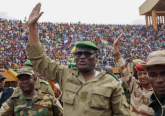
First the good news: for the first time in Pakistan’s history a civilian government has completed its full five-year term—a development that has momentous value for a country whose political history has been dominated by army intervention. Now the bad news: during the same period, religiously-motivated violence has killed nearly 40,000 civilians and security personnel; over 250 Shias have lost their lives in three major bombings in Karachi and Quetta since January; and nearly 200 Christian homes were set ablaze in Lahore earlier this month.
Such is the bloody price citizens have to pay when a state fails to separate religion from politics. Internally, Pakistan is gripped by a pattern of cyclical violence being expressed intermittently in the form of Taliban terrorism, violent sectarianism, and persecution of minorities under the notorious blasphemy laws. These violent religious groups also continue to jeopardize its regional standing and international image. This is despite recent governmental attempts to rethink foreign policy priorities and normalize relations with Afghanistan and India. Fears persist regarding the possibility that the Taliban could recapture Kabul with Pakistan’s assistance and that Pakistan-based extremist groups may renew their jihad in Kashmir after NATO troops leave Afghanistan next year. The international community also remains to be convinced of Pakistan’s true commitment to the war against terrorism
There is little doubt that the consistent growth of fanaticism, especially in its recent militant manifestations, has become Pakistan’s most formidable challenge today. The roots of this gory trend are to be found in the nature of Pakistan’s birth as a nation. There is no doubt that religion was a major factor in the creation of Pakistan, as the Two Nation Theory (where many Muslims thought that their rights would not be protected in a majority Hindu state) formed the basis of All-India Muslim League’s demand for a separate homeland for Indian Muslims. However, its leader, Muhammad Ali Jinnah, preferred to seek due constitutional rights for Muslims within united India until a year before Partition in August 1947. He had, for instance, agreed to the May 1946 British-sponsored Cabinet Mission Plan for a loose federal set-up in India, which was rejected by the Jawaharlal Nehru-led Indian National Congress. In the run-up to Partition, Jinnah did frequently play the religious card to garner mass Muslim support for a separate state. However, he began articulating a secular narrative as soon as Partition emerged as the only option and the concept of Pakistan got closer to reality.
For instance, in a major policy speech before the Constituent Assembly in Karachi on August 11, 1947, just three days before Pakistan’s inception, he stated, “You are free to go to your temples, you are free to go to your mosques or to any other place or worship in this state of Pakistan. You may belong to any religion or caste or creed that has nothing to do with the business of the state. We are starting with this fundamental principle that we are all citizens and equal citizens of one state…and you will find that in course of time Hindus would cease to be Hindus and Muslims would cease be Muslims, not in the religious sense, because that is the personal faith of each individual, but in the political sense as citizens of the state.”
Pakistan was, thus, born with a paradox: Islam was used to create the country, but when it was about to become a reality, the founding leader clearly stated that Islam would not be the basis of statehood. Jinnah was pragmatic enough to realize that giving religion a role in politics might produce disastrous consequences. But, unlike Mustafa Kemal Ataturk, the founder of Turkish Republic, he did not live long enough to shape the structural bases of the new state in accordance with his secular ideals. As a result, less a year after Jinnah’s death, on 7 March 1949, the Constituent Assembly adopted the Objectives Resolution, which has been a preamble of the three the country has had since 1956. It stated: “Whereas sovereignty over the entire universe belongs to God Almighty alone and the authority which He has delegated to the state of Pakistan through its people for being exercised within the limit prescribed by Him is a sacred trust.”
This is the moment when the process of the Islamisation of politics began in Pakistan, and there has been no turning back since then. The Objectives Resolution transformed Pakistan from a Muslim-majority state into an Islamic republic. Religious leaders who had opposed the demand for Pakistan and criticized Jinnah’s progressive ideas became the custodians of its destiny. With Islam becoming the principal pillar of statehood, it was inevitable that the minority question would arise, as was manifested in the 1953 riots against Ahmadis in Lahore. However, the religious right remained a peripheral force until the 1970s, and gained serious political clout only during the Bhutto regime, which banned alcohol, declared Ahmadis as non-Muslim and cultivated close ties with Saudi Arabia.
This is when Pakistan started to experience a major shift from a pacifist sub-continental-Persian religious tradition into a violent, Wahhabi-inspired dogmatic creed. Two epoch-making regional developments in 1979—the revolution in Iran and the Soviet invasion of Afghanistan—were instrumental in General Zia’s efforts to consolidate political power and institutionalize Islamic extremism, particularly through imposition of Sharia law. Pakistan’s association with the Afghan jihad during his rule and with the Kashmir struggle in its aftermath further strengthened religiously radical tendencies within both the state and wider society. The most recent history of Pakistan, , especially since the start of the current Afghan war, has seen these tendencies gaining further momentum.
Thus, 66 years after the establishment of the nation, the religious factor underpinning Pakistan’s creation and statehood has become the principal source of its greatest national tragedy. Indiscriminate violence against minorities as well as other Muslims by extremists groups who abuse the Islamic faith negates every visionary word Jinnah had uttered about the future secular and peaceful destiny of the country on the eve of its creation.
Eventually, Pakistan’s salvation lies in reversing the process of regression that has held it hostage over the last several decades, especially when its deadly humanitarian consequences are now more visible than ever. The PPP-led civilian government may have completed its official tenure, but neither it nor the previous Musharraf regime did anything tangible to deal with Zia’s legacy or even initiate a dispassionate national debate on the role of religion in matters of state. Tackling Pakistan’s founding paradox may take decades, but the time for taking the first step is now. We can only hope that Pakistan’s democratization process will move forward; and civilian leaders who assume power after the forthcoming general elections will act as pragmatically as Jinnah and show the due political resolve to institutionalize his secular, progressive ideals of statehood. Otherwise, the debilitating trend of Islamic extremism and violence would continue to generate humanitarian tragedies both in Pakistan and beyond its frontiers.
The author is the Quaid-i-Azam Fellow at St. Antony’s College, University of Oxford.




2 Comments
Completely agree
Very rightly suggested to institutionalize Quaid’s secular, progressive ideals of statehood sir, but the realities are showing the reverse of what you dream of. The seat adjustment development between PML-N and the JUI-F and the alliance between Imran Khan and JI are the harsh facts which tells us that the process which Zia started will remain intact on the political horizons of this country for the coming decades or at least till his predecissors are alive in the political arena of this unfortunate state. At the end of the PPP Govt., if we want any alternative, what can that be sir? Can we dream of anything pragmatic like Jinnah, from a coalition of Nawaz Sharif and Fazal Rehan, or a coalition of Imran Khan and Munawar Hasan, against terrorism and terrorists? Looking at the past track record, all these people are the one who are the suspects of being not against the Talibaan and are believed to be the staunch supporters of these elements. Now what do we do, if not vote for the lesser evil PPP at this moment? In fact these are the people who are inforcing the people of Pakistan to vote for Zardari and Rehman Malk and bring them back to the corridors of government.
We, Sir, are the most unfortunate nation on the surface of the earth, with little choices than none, to bring a sincere leadership, who bring back peace and prosperity to this terror-torn state. We have been cursed by the dreams ans realities of Jamal ud din Afghani, Allama Iqbal, Sir syed ahmad Khan, Mohammad Ali Jawhar and M.A.Jinah. We have to live between Myth and Reality till these lords of the wars exist in this unfortunate country. …… and the game will go on…